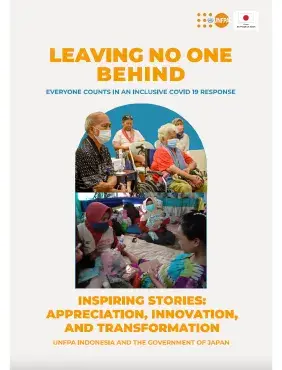Indonesia is one of the world’s most disaster-prone regions. This vulnerability increased, when in the first quarter of 2020, the country faced a new threat from the global COVID 19 pandemic, and which has since had a major multi-sectoral impact on Indonesia.
Those hit hardest by the COVID 19 crisis were those already at risk of being furthest left behind, and as such the COVID 19 crisis has slowed progress towards achieving the SDGs in Indonesia.
UNFPA’s ‘Leaving No One Behind’ (LNOB) was an 18-month project, from 1 April 2021 - 30 September 2022. Supported by the Government of Japan (GOJ) and involved strong collaboration with 15 government and non-government partners, in 76 districts and municipalities, in 22 Indonesian provinces. The LNOB project was supported by the Government of Japan to ensure the continuation of support and equal opportunities in access to sexual reproductive health services (SRH) and outreach to the most vulnerable populations who were often overlooked in the COVID 19 response, particularly women and girls, pregnant women, GBV survivors, older persons, persons with disabilities (PWD), and people living with HIV (PLHIV).
This report records the human stories of people involved in the project. They included those working closely with communities, such as local partners and leaders, front-liners, human rights advocates, social protection support workers and the project beneficiaries. Unlike problem-oriented and risk-focused assessments that limit relationship building, positive experiences unite people with similar values and goals and subsequently open systems of working together to transform people’s lives with better possibilities. In short, we asked people to highlight the most significant impacts of the LNOB project and things that people were proud to share with the LNOB stakeholders.


